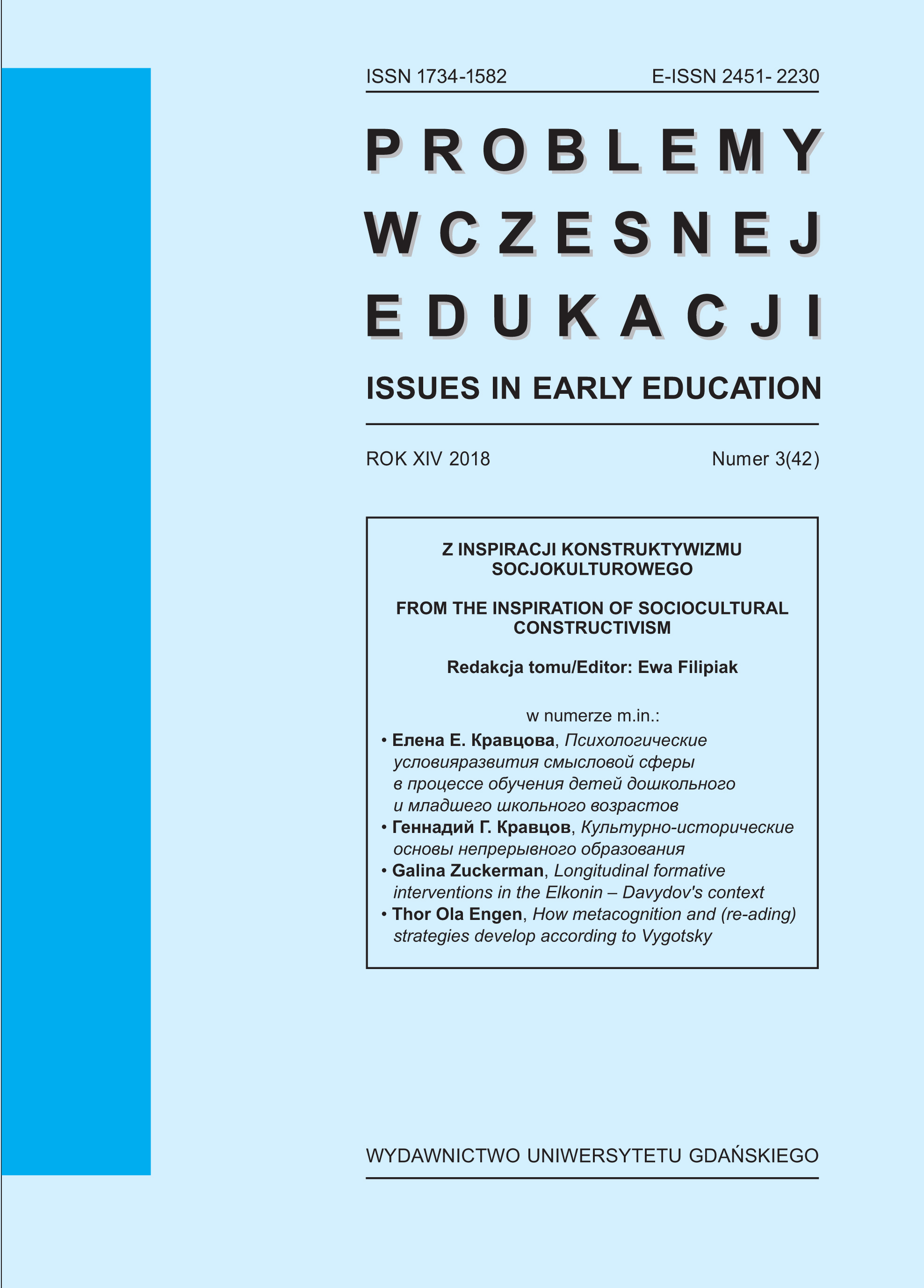How metacognition and (reading) strategies develop according to Vygotsky
DOI:
https://doi.org/10.26881/pwe.2018.42.04Słowa kluczowe:
metacognition, reading strategies, learning strategies, scientific concepts, VygotskyAbstrakt
The paper addresses the concepts of metacognition and (reading) strategies, the origin of which is usually traced back to the 1970s. However, the paper argues that conscious awareness, which Vygotsky introduced as early as the 1930s, is another term for metacognition. Further, according to Vygotsky, “… conscious awareness enters through the gate opened up by scientific concept” (Vygotsky 1987: 191, italics added), meaning that metacognitive skills develop in instruction, as a function of student’s work with academic concepts. This hypothesis, however, seems to be ignored by contemporary, mainstream researchers. For example, an influential study like PIRLS, contradictory to Vygotsky’s hypothesis, assumes that students already at the end of the elementary stage apply metacognitive skills – included reading strategies – in order to construct meaning in reading.
Downloads
Bibliografia
Afflerback P., Pearson P.D., & Paris S.G. (2008), Clarifying differences between reading skills and reading strategies. “The Reading Teacher”, 6.
Berge I.M., Helgevold L., & Schulz-Heidorf K. (2017), Hva lærerne rapporterer om egen undervisning i strategier. In: E. Gabrielsen (Ed.), Klar framgang! Leseferdighet på 4. og 5. trinn i et femtenårsperspektiv. Oslo, Universitetsforlaget.
Flavell J.H., Miller S.A., & Miller P.H. (2002 [1987]), Cognitive development (4th ed.). Upper Saddle River, N.J., Prentice Hall.
Fox E. & Risconscente M. (2008), Metacognition and Self-Regulation in James, Piaget, and Vygotsky. “Educational Psychology Review”, 20. doi:DOI 10.1007/s10648-008-9079-2.
Gabrielsen E. & Strand O. (2017), Rammer og metoder for PIRLS 2016. In: E. Gabrielsen (Ed.), Klar framgang! Leseferdighet på 4. og 5. trinn i et femtenårsperspektiv. Oslo, Universitetsforlaget.
Haugen C.R. (2014), Hva er egentlig grunnleggende ferdigheter? In: C.R. Haugen & H.T.A. (Eds.), Pedagogikk, politikk og etikk. Demokratiske utfordringer og muligheter i norsk skole. Oslo, Universitetsforlaget.
Klette K. (2007), Bruk av arbeidsplaner i skolen – et hovedverktøy for å realisere tilpasset opplæring? “Norsk pedagogisk tidsskrift”, 91(4).
Kulbrandstad L.I. (2003), Lesing i utvikling: teoretiske og didaktiske perspektiver. Bergen, Fagbokforl.
Kulbrandstad L.I. (2018), Lesing i utvikling: teoretiske og didaktiske perspektiver (2. utg. ed.). Bergen, Oslo, Fagbokforl. Landslaget for norskundervisning.
Popkewitz T. (1998), Struggling for the Soul. The Politics of Schooling and the Construction of the Teacher. New York, Teachers College Press.
Pressley M. (2000), What should comprehension instruction be instruction of? In: M. Kamil, P. Mosenthal, P.D. Dole, & R. Barr (Eds.), Handbook and reading research (Vol. III). Mahwah, Erlbaum Associates Publishers.
Roe A. (2014), Lesedidaktikk: etter den første leseopplæringen (3. utg. ed.). Oslo, Universitetsforl.
Rommetveit R. (1972), Språk, tanke og kommunikasjon: ei innføring i språkpsykologi og psykolingvistikk. Oslo, Universitetsforl.
Rydland V. (2007), Minoritetsspråklige elevers skoleprestasjoner: Hva sier empirisk forskning? Acta Didactica, Upaginert.
Vygotsky L.S. (1987), Thinking and Speech. In: R.W. Rieber & A.S. Carton (Eds.), The Collected Works of L.S. Vygotsky (Vol. 1: Problems of general psychology). New York, Plenum Press.

 Uniwersyteckie Czasopisma Naukowe
Uniwersyteckie Czasopisma Naukowe





